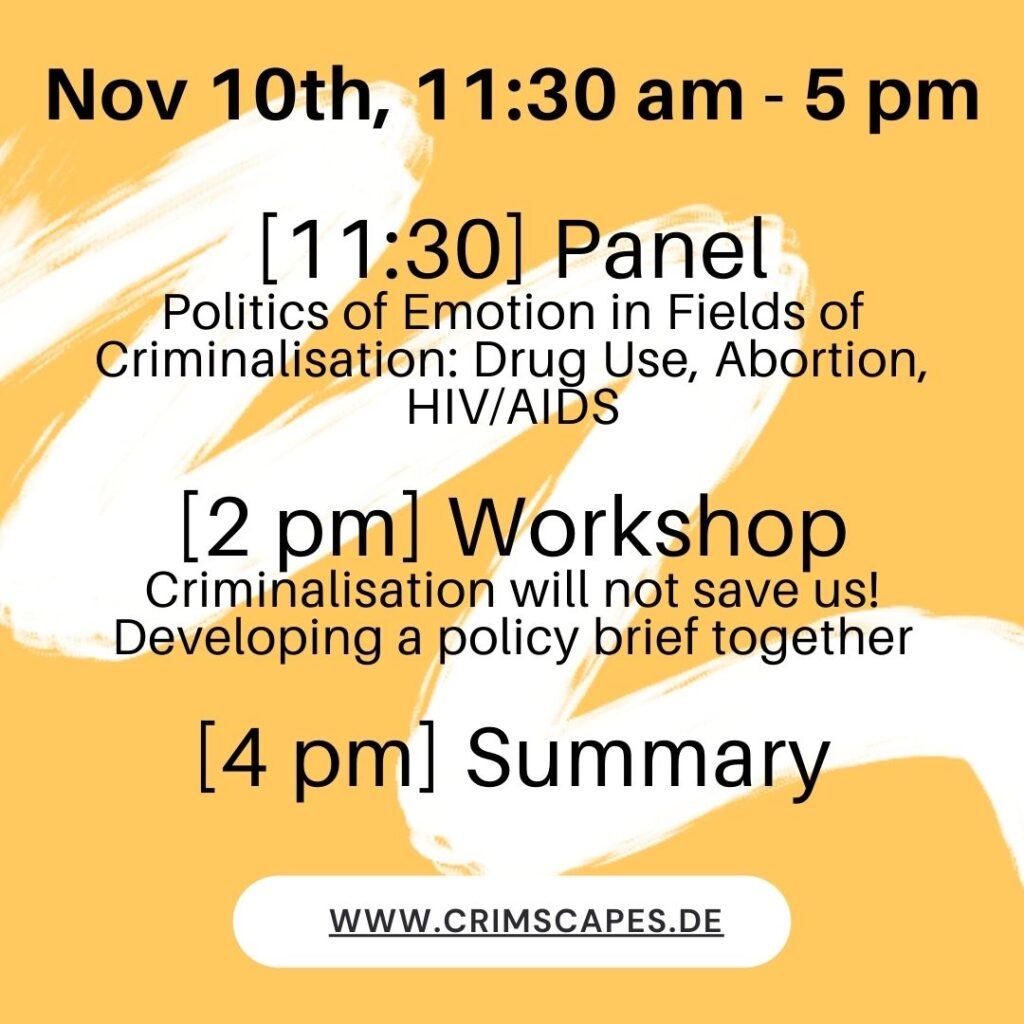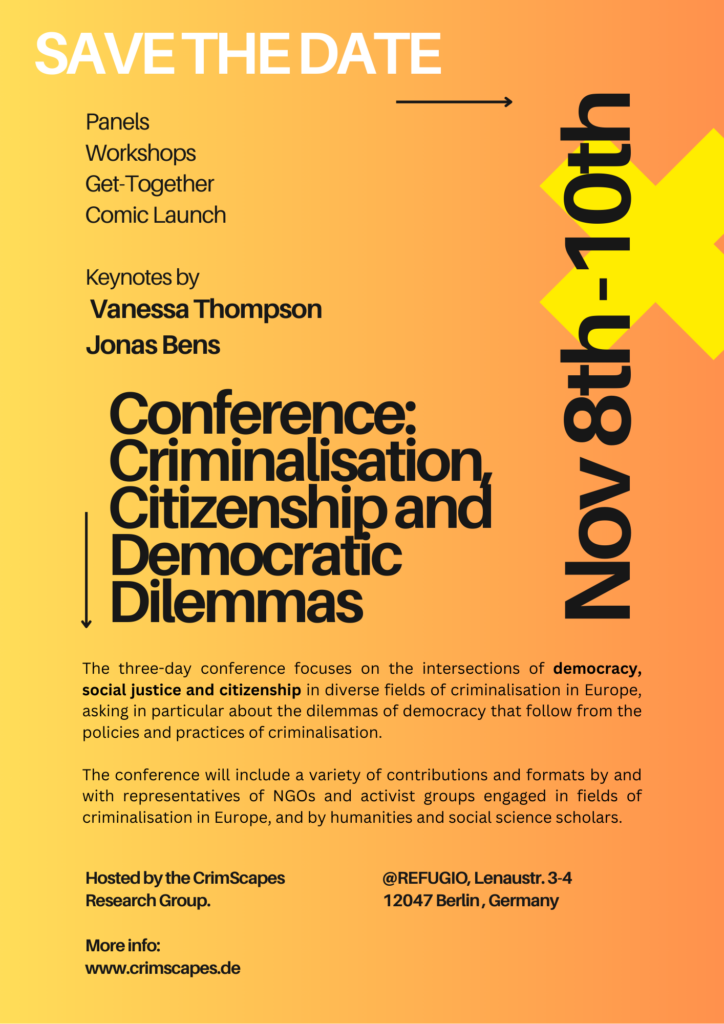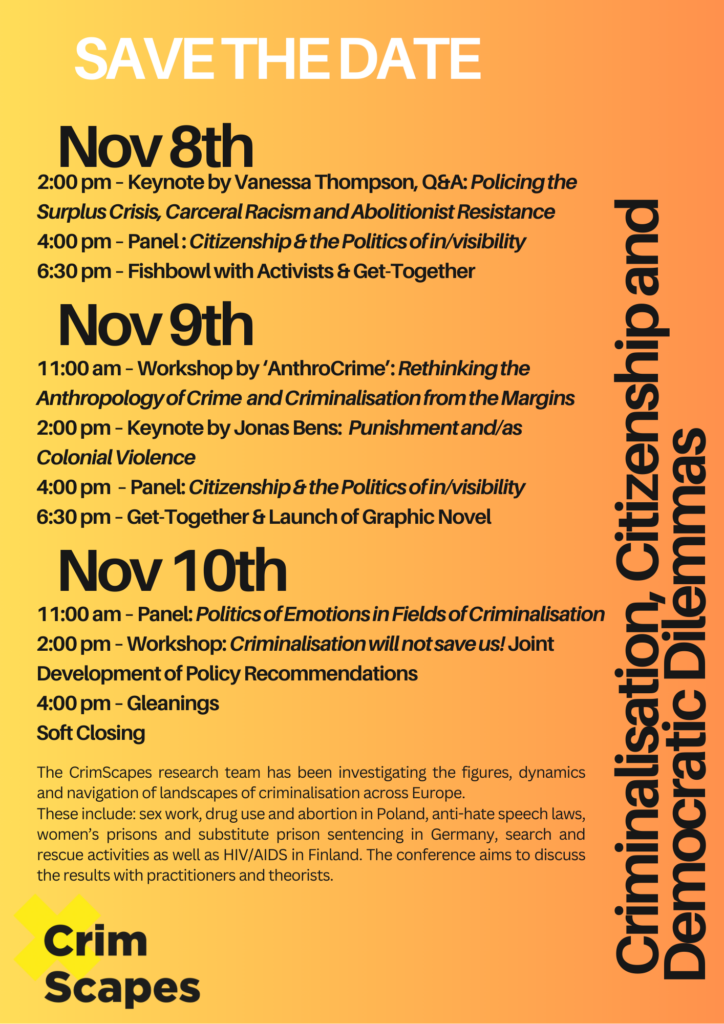New Publication edited by Mathilde Darley, Routledge, 2022
Since the early 2000s, academic scholarship within and across borders has witnessed such a proliferation of studies on “sex for sale” that, by now, it has become difficult to claim to shed any new light on the topic. Social-scientific research has largely managed to interrogate both the epistemology of knowledge on paid sex and the methodologies governing the production of such knowledge (Spanger and Skilbrei 2019), as well as the actors, logics, and forms of control in the sex market (Sanders, Laing, 2019; Skilbrei and Spanger 2020). Notions of consent, coercion and violence as potentially consistent with sex work—a central fault line of debates on commercialized sex beginning in the 1970s and 1980s—structure (as much as they divide) the academic and activist fields, but also public policies regulating sex for sale. Depending on the respective weight of abolitionists or regulationists on the national political scene, the regulation of sex work has thus been subject to vastly distinct legislation across different countries, all in the name of the same goal: protecting the rights of people engaged in sex work, in particular women (on France and Germany, see for example Darley 2022).
This has grown even more significant as the problem of trafficking for purposes of sexual exploitation has, beginning in the 1990s, returned to the international agenda, with victim protection ostensibly becoming the fundamental driving force for anti-trafficking policies. Although the figures meant to attest to the extent of the phenomenon vary significantly (estimates by international organizations range from 700,000 to 4 million victims per year and appear to be problematic in their construction, see Tyldum and Brunovskis 2005; Mathieu 2012a), they have not hindered the establishment of a political, legal, and media consensus around the need to deploy new instruments to combat trafficking and to protect its victims. This consensus on the need to act, carried out by state and non-state, national and international, repressive and aid-based actors, has resulted in a normative and legal surge that is reflected in particular, since the start of the 1990s, by the proliferation of international texts and their translation into national law (Halley et al. 2006; Ragaru 2007).
Nonetheless, the apparent consensus on the need to fight against trafficking, presented as the new face of “modern slavery,” cannot hide the interpretive quarrels around the definition of the “problem” and its supposed origins. Trafficking in human beings emerges indeed as a site in which other contemporary controversies, like sexuality and its commercialization, but also international migration and its supposed links to organized crime, become embedded and persistent.
The case of non-national sex workers, however, is of particular interest in this regard. For if these figures occupy a privileged position as objects of projection (both in the media and in political and academic spheres) for stereotypical representations of the “ideal” (Jakšić 2016) or “absolute victim” (May 2014) and for the politics of sympathy meant to accompany them (Fassin 2011), they are still caught within the security-focused terms of public debates around questions of immigration and sex work. In fact, the contemporary politicization of trafficking justifies through victim protection the deployment of repressive policies to strengthen border control and the fight against clandestine immigration (O’Connell Davidson 2006; Mathieu 2012b). Given its historical influence over how Western societies have understood their civilized character (Stoler 2002), sexuality seems to have played a particular role in the way anti-trafficking policies have been linked to both restrictive border and migration control policies and to humanitarian rhetorics (Ticktin 2008; Mai 2016).
This master narrative of anti-trafficking policies, linking “sexual humanitarianism” (Mai 2014) to border security, has been the subject of a number of research works. However, while many authors have analyzed policies for regulating sexualities, including policies for combatting trafficking and regulating sex work, as stemming from a gendered conception of sexual-economic exchange (Tabet 2004), sex work and trafficking have been analyzed mainly as issues of gender inequality (Spanger and Skilbrei 2019) rather than as embedded in classed and racialized social relationships (Doezema 2000; Kempadoo 2001; Agustìn 2007; Chimienti and Lieber 2020). In particular, few works have tackled the very entanglement of racialized, gendered, classed and sexualized preconceptions in addressing trafficking for sexual exploitation through anti-trafficking policies and support measures towards victims. The practices of different classificatory institutions that participate in the definition of trafficking, its victims and offenders, as well as their very concrete effects on the everyday life of sex workers and on (especially female) migrants, have not often been empirically explored nor considered together.
The texts gathered here focus, therefore, less on the broad outlines of the discursive realm of trafficking and sexual exploitation as a public policy issue, than on its practical ramifications. In particular, all seek to understand its effects on the production, in action, of the leading figures who structure, legitimize, and govern this field of public action—that is, not only that of the “victim,” but also of the “trafficker,” “pimp” or “exploiter,” which remains relatively understudied, not so much because of the hidden nature of his activities as from the almost unanimous moral condemnation he undergoes and the ethical and deontological questions this raises for research. Rather than focusing on “victims” and “exploiters” as identifiable social groups, this book thus endeavors, through its various chapters, to highlight the processes of categorization through which these figures end up institutionally produced and consolidated, with particular importance attached to the gendered and racialized dynamics underlying them.
To do so, we pay particular attention to the sociology of actors and institutions in interaction, and to the role these play on a daily basis in framing trafficking and pimping, in constituting expertise (lay or learned) on their subject, in rendering their definition workable (through law as well as through the construction and dissemination of a “common sense”), as well as in implementing corresponding policies of repression (for perpetrators) and protection (for victims). Our purview ranges from experts who were summoned at the start of the 20th century by the League of Nations to give grounding for the “myth” of the white slave trade, to Western tourists crisscrossing Thailand in search of first-hand knowledge of the clashes and misfortunes of the sex trade; from police officers selecting cases each day as worthy or unworthy of being defined as exploitation, to researchers participating in consolidating, legitimizing and circulating the categories of thought and action relating to trafficking; from representatives of urban policies who define who does or does not constitute a disturbance to order in an urban setting (and to the gendered order on which this is based), to abolitionists who appoint themselves the monopoly of defining violence, exploitation and “good” sexuality; from social workers and psychologists working in shelters for women who are victims of trafficking or “at risk” of exploitation in the so-called origin countries, to magistrates in the so-called destination countries who lay down judgments on exploitation and its perpetrators, thereby consecrating its victims. All the institutions studied here, and the street-level bureaucrats (Lipsky 1980) at play, contribute, through their daily interaction with the public and on very different levels of action (prevention, control, repression, reparation), to bring trafficking into existence, to frame its perpetrators and victims and to shape the forms of regulation implemented in response. In devoting attention not only to the values, affects and normative beliefs of these actors together, but also to their professional routines of classification and labelling, we try to better grasp how this complex latticework of public action embodied by them—and the circulation of knowledge and legitimacy connecting them—help to institutionalize trafficking as a gendered and racialized “disorderly conduct,” thus illuminating the contours of public order and the means dedicated to its preservation.
In addition to considering different levels of institutionalization of the “problem” of sexual exploitation, in ways rarely brought together in analysis, the chapters of this book present different case studies located outside the scope of the traditional “Global North,” and in particular within countries widely considered as areas of origin for trafficking, such as Laos, Thailand, Brazil, or, in southeastern Europe, Bulgaria. If the case studies rooted in so-called “Northern” countries (such as France, Germany, or Norway) highlight in particular the contribution of feminist movements, for the sake of struggles against the exploitation of women, to the adoption of repressive penal policies (see Bernstein 2012) criminalizing the sale and/or purchase of sexual surfaces, putting the “Northern” and “Southern” terrains into perspective reveals with particular insight the international dissemination of the concept of trafficking in human beings, its gendered and racialized meanings, and the way it serves global policies of population control.
Finally, the high priority given to ethnographic surveys makes it possible both to observe daily practices of evaluation and classification, and to compare these observations to the meanings that people give in interviews to their own practices. The archival work undertaken in some of the texts lends historical depth to these representations by returning to the international and/or national genesis of conceptions that have become dominant today for sex work and the forms of exploitation that can accompany it. And the dissemination of survey questionnaires makes it possible to listen to sex workers, integrating into the analysis the voices of those who are the targets of governmental action but whose experience is generally reduced to interpretations in terms of exploitation or oppression, through a politics of silence (Kempadoo 2001) whose effectiveness is reinforced by their status as non-nationals. By focusing on the practices that construct trafficking as a public problem, on forms of interaction more than on discourses, the book also gives an empirical anchoring and a singular thickness to the comments of sex workers as to the concrete consequences of these issues on their life experiences.
References (selection)
Agustìn, L. M. (2007). Sex at the Margins. Migration, Labour, Markets and the Rescue Industry. London: Zed Books.
Bernstein, E. (2012). Carceral politics as gender justice? The “traffic in women” and neoliberal circuits of crime, sex, and rights. Theory and Society, 41(3), pp. 233-259.
Chimienti, M. and Lieber, M. (2020). A ‘continuum of sexual economic exchanges’ or ‘weak agency’?. In: M.-L. Skilbrei and M. Spanger, eds., Understanding Sex for Sale. Meanings and Moralities of Sexual Commerce, New York: Routledge, pp. 126-142.
Darley, M. (2022). Juger la traite des êtres humains en France et en Allemagne: la construction pénale de la victime d’exploitation sexuelle. Sociétés contemporaines, 125, pp. 175-201.
Doezema, J. (2000). Loose Women or Lost Women? The Re-Emergence of the Myth of White Slavery in Contemporary Discourse of Trafficking in Women. Gender Issues, 18(1), pp. 23-50.
Fassin, D. (2011). Humanitarian Reason: A Moral History of the Present. Berkeley: University of California Press.
Halley, J., Kotiswaran, P., Shamir, H. and Thomas, C. (2006). From the International to the Local in Feminist Legal Responses to Rape, Prostitution/Sex Work, and Sex Trafficking. Harvard Journal of Law & Gender, 29(2), pp. 336–423.
Jakšić, M. (2016). La traite des êtres humains en France. De la victime idéale à la victime coupable. Paris: CNRS Editions.
Kempadoo, K. (2001). Women of Color and the Global Sex Trade. Transnational Feminist Perspectives. Meridians: feminism, race, transnationalism, 1(2), pp. 28-51.
Lipsky, M. (1980). Street Level Bureaucrats. Dilemmas of the Individual in Public Services. New York: Russell Sage Foundation.
Mai, N. (2014). Between Embodied Cosmopolitism and Sexual Humanitarianism. The Fractal Mobilities and Subjectivities of Migrants Working in the Sex Industry. In: L. Anteby-Yemini, V. Baby-Collins, S. Mazzella S., eds., Borders, Mobilities and Migrations, Perspectives from the Mediterranean in the 21st Century. Brussels: Peter Lang.
Mai, N. (2016). ‘Too Much Suffering’: Understanding the Interplay between Migration, Bounded Exploitation and Trafficking through Nigerian Sex Workers’ Experiences.Sociological Research Online, 4(21).
Mathieu, L. (2012a).De l’objectivation à l’émotion. La mobilisation des chiffres dans le mouvement abolitionniste contemporain. Mots. Les langages du politique, 100, pp. 173-185.
Mathieu, L. (2012b).An ambiguous compassion : Policing and debating prostitution in contemporary France. Sexuality Research and Social Policy, 9(3), pp. 203-211.
O’Connell Davidson, J. (2006). Will the Real Sex Slave Please Stand up?. Feminist Review, 83, pp. 4-22.
Ragaru, N. (2007). Du bon usage de la traite des êtres humains. Controverses autour d’un problème social et d’une qualification juridique. Genèses, 66, pp. 69-89.
Sanders, T. and Laing M., eds. (2019). Policing the Sex Industry: Protection, Paternalism and Politics. New York: Routledge.
Skilbrei, M.-L. and Spanger, M., eds. (2020). Understanding Sex for Sale. Meanings and Moralities of Sexual Commerce. New York: Routledge.
Spanger, M. and Skilbrei, M.-L., eds. (2019). Prostitution Research in Context: Methodology, Representation and Power. New York: Routledge.
Stoler, A. L. (2002). Carnal Knowledge and Imperial Power Race and the Intimate in Colonial Rule. Berkeley: University of California Press.
Tabet, P. (2004). La grande arnaque. Sexualité des femmes et échange économico-sexuel. Paris: L’Harmattan.
Tiktin, M. (2008). Sexual Violence as the language of Border Control: Where French Feminist and Anti-Immigrant Rhetoric Meet. Signs: Journal of Women and Culture in Society, 33(4), pp. 863-889.
Tyldum, G. and Brunovskis, A. (2005). Describing the Unobserved: Methodological Challenges in Empirical Studies on Human Trafficking. International Migration, 43(1/2), pp. 17-34.
Table of Contents
Part I – Making trafficking come true: counting, appraising and classifying
Chapter 1 – How to Establish the Reality of Trafficking in Women? The Selective Disqualification of Sources by the Special Body of Experts of the League of Nations (1924-1927), Jean-Michel Chaumont
Chapter 2 – Sex Trafficking and “Reality Tourism” in Thailand: New Experts, Elizabeth Bernstein, Elena Shih
Chapter 3 – From Social Experience to Cultural Expertise:
The Role of Nonprofit Organizations in Identifying Sex Trafficking Victims in France, Mathilde Darley
Chapter 4 – Negotiating the Territories of Anti-Trafficking Efforts: The ‘Unlikely Cooperation’ between Police Officers and Social Workers in Germany, Anne Dölemeyer, Julia Leser
Chapter 5 – “There’s no place like home”: “Return Policies” for Human Trafficking Victims in Bulgaria, Nadège Ragaru
Chapter 6 – Classifying Sexual Exploitation: The Compensation of Trafficking Victims in France, Milena Jakšić
Part II – For the sake of the victims: criminalizing sex work, gendering public order
Chapter 7 – French Abolitionism: from Eradicating Regulationism to Promoting Social Care, Lilian Mathieu
Chapter 8 – Documenting the Impact of the 2016 French Prostitution Law: A Collaborative Study Prioritizing Sex Workers’ Voices, Hélène Le Bail, Calogero Giametta
Chapter 9 – Gender Violence and Violence Against Sex Workers: Irreconcilable Perspectives, Marylène Lieber, Elorri Harriet
Chapter 10 – Policing Prostitution, Producing Gender. Gendered Division of Labor and Management of Sexual Illegalisms, Gwénaëlle Mainsant
Chapter 11 – Pimps on Trial, Gilles Favarel-Garrigues, Lilian Mathieu
Part 3 – Think Globally, Act Locally. Antitrafficking policies, from universal humanitarian discourse to national border controls
Chapter 12 – Migration and Security: The Danger of Anti-Trafficking Heritage in Brazil, Guilherme Mansur Dias
Chapter 13 – Fighting Human Trafficking Outside the Framework of Human Rights: The Effects of Anti-Trafficking Regimes in Brazil, Adriana Piscitelli
Chapter 14 – Trafficking Prevention for Workforce Retention. Categorizing “Women at Risk” in Laos, Estelle Miramond
Chapter 15 – Red Lights for Prostitution: Policing the Purchase of Sex in Norway, Synnøve Jahnsen and May-Len Skilbrei
Chapter 16 – Judging Sexual Exploitation: A “Cultural” Crime? Mathilde Darley




